So, your family and friends often catch you while you just biting your nails (innocently). Relax Life Happens!
Nail biting, scientifically referred to as onychophagia, is a habit that plagues people of all ages. It’s often an automatic response to stress, anxiety, or even sheer boredom.
If you’re tired of hiding your bitten nails and yearn for the elegance of well-groomed fingers, you’re in the right place.
In this in-depth guide, I will share five proven tips on how to stop biting your nails.
This article will help you conquer the nail-biting habit and achieve beautiful, healthy nails like my friend Mittal does. Yes, she followed these tips and now she does not even thing of biting nails.
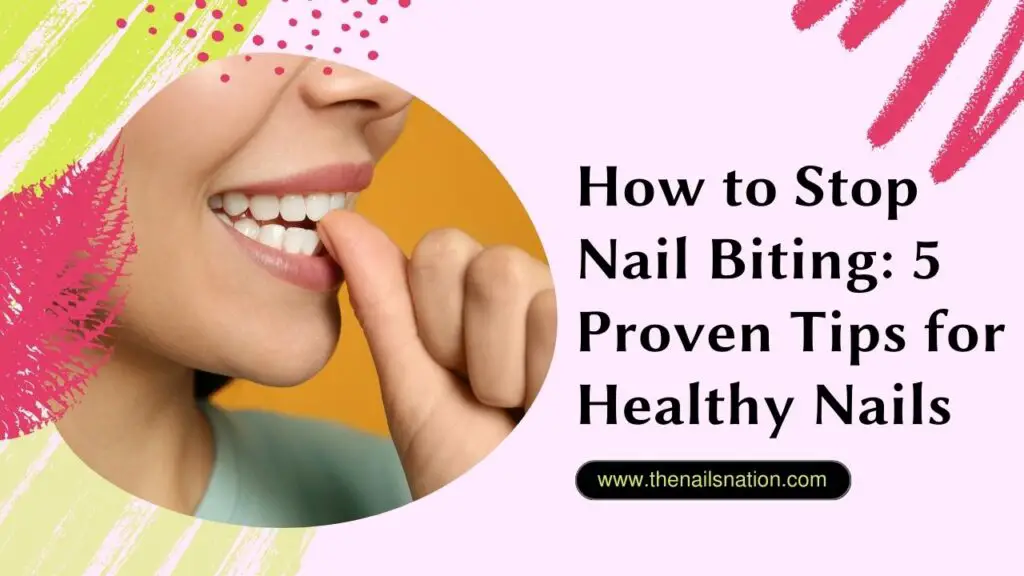
What is the Reason of Nail Biting?
Before we explore strategies to stop nail biting, it’s crucial to understand Why Some People Bite Their Nails.
Some folks have a habit of biting their nails, and there are a few reasons why they do it. Let’s talk about it in simple terms:
→ Stress and Nerves: Imagine you have a big test or something important coming up, and you start feeling nervous or stressed. Some people bite their nails when they’re worried or anxious. It’s like a way to calm themselves down.
→ Feeling Bored: Have you ever been bored, like when you have nothing to do? Well, some people bite their nails out of boredom. It’s kind of like a way to keep busy.
→ Wanting Perfect Nails: Some folks like their nails to look just right. If they see a little bump or something on their nail, they might start biting it to make it smooth. This can become a habit over time.
→ Expressing Emotions: Sometimes, people don’t say how they feel with words. Instead, they bite their nails when they’re upset or mad. It’s like their way of showing their feelings.
→ Copying Others: If someone you know, like a friend or family member, bites their nails, you might start doing it too. It’s a bit like following their lead.
→ Feels Good: Believe it or not, some people like how it feels to bite their nails. It’s like a little sensation they enjoy.
→ Used to It: If you’ve been biting your nails for a long time, it can turn into a habit. You might do it without even thinking about it.
But there’s something important to know. Nail biting can sometimes make your nails and teeth not as healthy. It can also lead to getting sick more often.
So, if you’re trying to stop, don’t worry, it’s possible! You can try different things, like keeping your nails short, using a special nail polish that tastes bad, or finding something else to do with your hands when you feel like biting your nails.
How To Stop Biting Nails Permanently
Now, let’s get to the point. Here are your easy and effective tips that can help you stop biting nails permanently.
Tip 1: Keep Your Nails Neat and Trim
One simple way to stop nail biting is to keep your nails looking good. When your nails are short and neat, there’s less temptation to bite them. Regularly taking care of your nails reminds you not to bite them.
Start by cutting your nails so they’re short and tidy. Short nails not only look better but also make it harder to bite.
If you’re not sure how short to make them, you can ask a nail expert for help. They can give you a good starting point for healthier nails.
Tip 2: Use Bitter-Tasting Nail Polish
Here’s an easy trick to help you stop biting your nails: bitter-tasting nail polish. This special nail polish tastes really bad, and that’s the point. When you put it on your nails, especially where you usually bite, it reminds you not to bite them.
The bitter taste makes your brain associate nail biting with something unpleasant. Over time, your brain will stop thinking it’s a good idea to bite your nails. It’s a simple way to help you break the habit.
Tip 3: Keep Your Mouth Busy with Alternatives
Sometimes, people bite their nails because they want to keep their mouth busy. It’s like a way to deal with stress or anxiety. To stop this, it’s important to replace nail biting with a better habit.
Instead of biting your nails, try chewing sugar-free gum or sucking on sugar-free mints. This gives your mouth something to do without hurting your nails or your health.
You can also keep a stress ball or a small toy to play with when you’re feeling nervous.
Experiment with these alternatives to see which one works best for you. Over time, you’ll get used to the new habit and stop biting your nails.
Tip 4: Manage Stress and Anxiety
For many people, nail biting happens when they’re stressed or anxious. It might make them feel better for a little while, but it’s not a good solution. Learning how to handle stress and anxiety is a great way to stop biting your nails.
Here are some things you can try:
Meditation: This is like a mental exercise that helps you stay calm. It can stop you from feeling like you need to bite your nails when you’re stressed.
Deep Breathing: When you take slow, deep breaths, it can calm you down when you’re feeling stressed.
Yoga: Yoga is a type of exercise that helps with stress, and it makes you feel more in control.
Mindfulness: This means paying attention to the present moment and not worrying about other things. It can help you feel less anxious.
Remember, everyone is different. What works for one person might not work for someone else. So, try different things to see what helps you feel calm and in control.
Tip 5: Visualization and Positive Thoughts
Along with the four tips we talked about, you can also try something called visualization and positive thoughts.
Visualization is like creating a mental picture of yourself with beautiful, healthy nails. It’s like telling your brain what you want. This can help you feel more determined to stop biting your nails.
Positive thoughts are like happy sayings you can tell yourself every day. They remind you that you have the power to stop biting your nails. For example, you can say:
- “I can stop biting my nails.”
- “My nails are strong and healthy.”
- “I’m choosing to take care of my nails.”
Say these positive thoughts every day, maybe when you look in the mirror.
Over time, they can help you believe that you can stop biting your nails.
So, remember, it’s important to stop biting your nails because it’s not just about how they look.
It’s also about keeping your nails and teeth healthy, staying well, and feeling good about yourself. You can do it with a little patience and practice!
Conclusion
Breaking the nail-biting habit is within your reach, and you’re not alone on this journey. Remember, it’s not just about having beautiful nails; it’s about your overall well-being.
You have the power to stop nail biting and enjoy the benefits of healthier nails and improved well-being. Take that first step today, and soon you’ll be proudly showing off your beautiful, nail-bite-free fingers!
We’d love to hear from you. Have you struggled with nail biting, or do you have tips and stories to share? Your experiences can inspire and help others on their path to healthier nails.
Click the share button to spread the word. If you found this article helpful, share it with your friends and family who might benefit from these tips.
Pin For Later
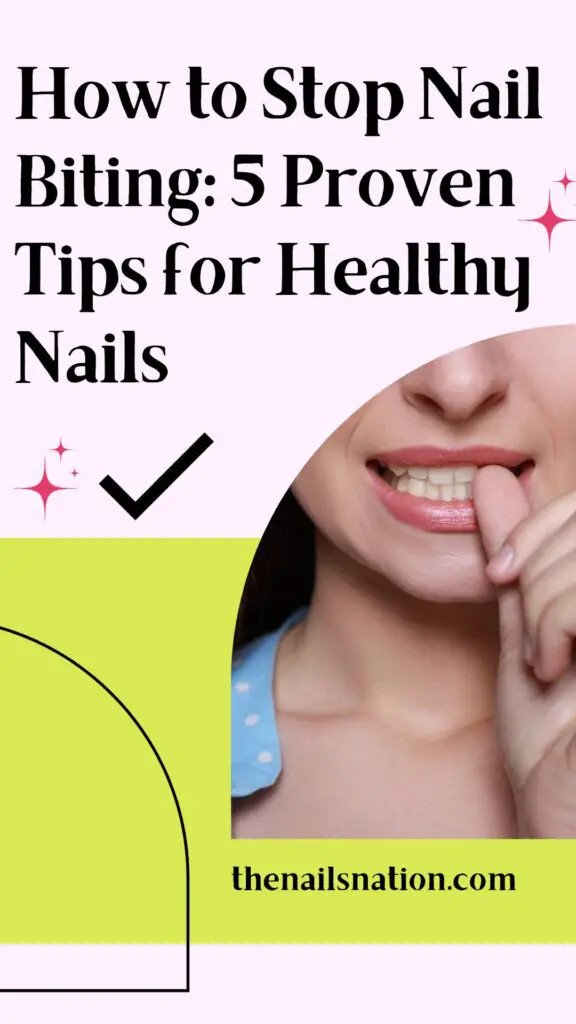

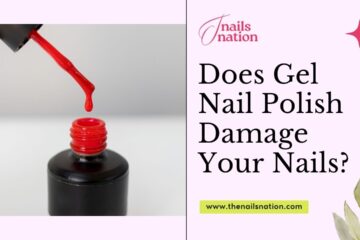
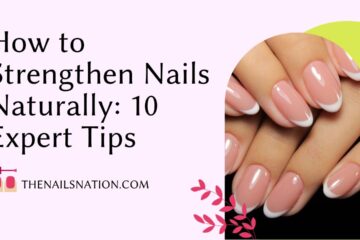
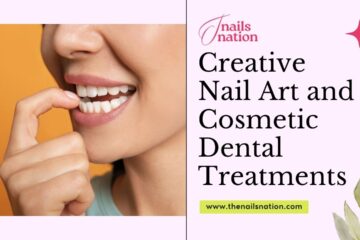
I really like how well-rounded this article is. How you started with simple tips then gradually shifted to talk about mental health issues and our thought patterns. The third one is my favorite one haha
Though your tips was helpful, 😊 I want to add one more. Get nail extensions done 😝 one will never bite nails again to keep the beauty intact ❤️
I’m about to say how this habit can be avoided for children as I have 2 tweens but realised it’s not only for kids as I have a sister who’s 4 years younger than me, a doctor herself, yet still does this bad habit from time to time. The tips you’ve given are great but would need mindful implementation to beat this bad habit.